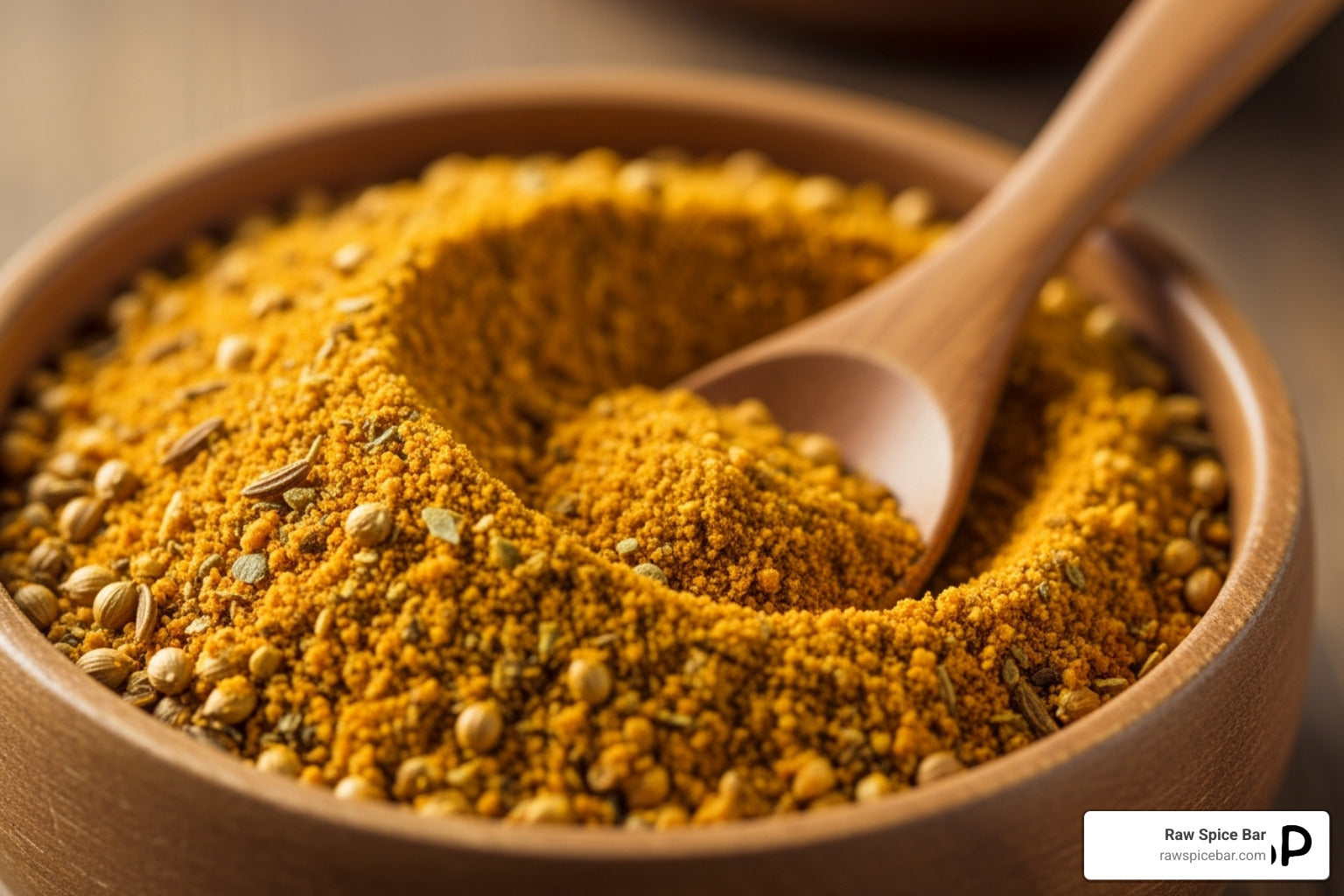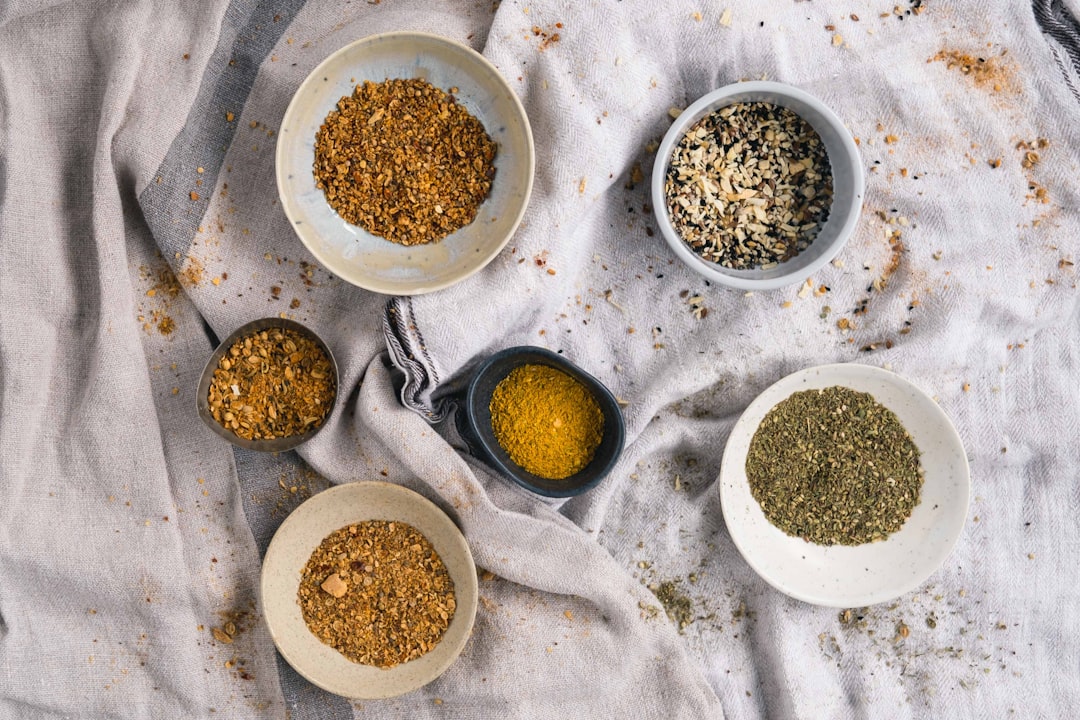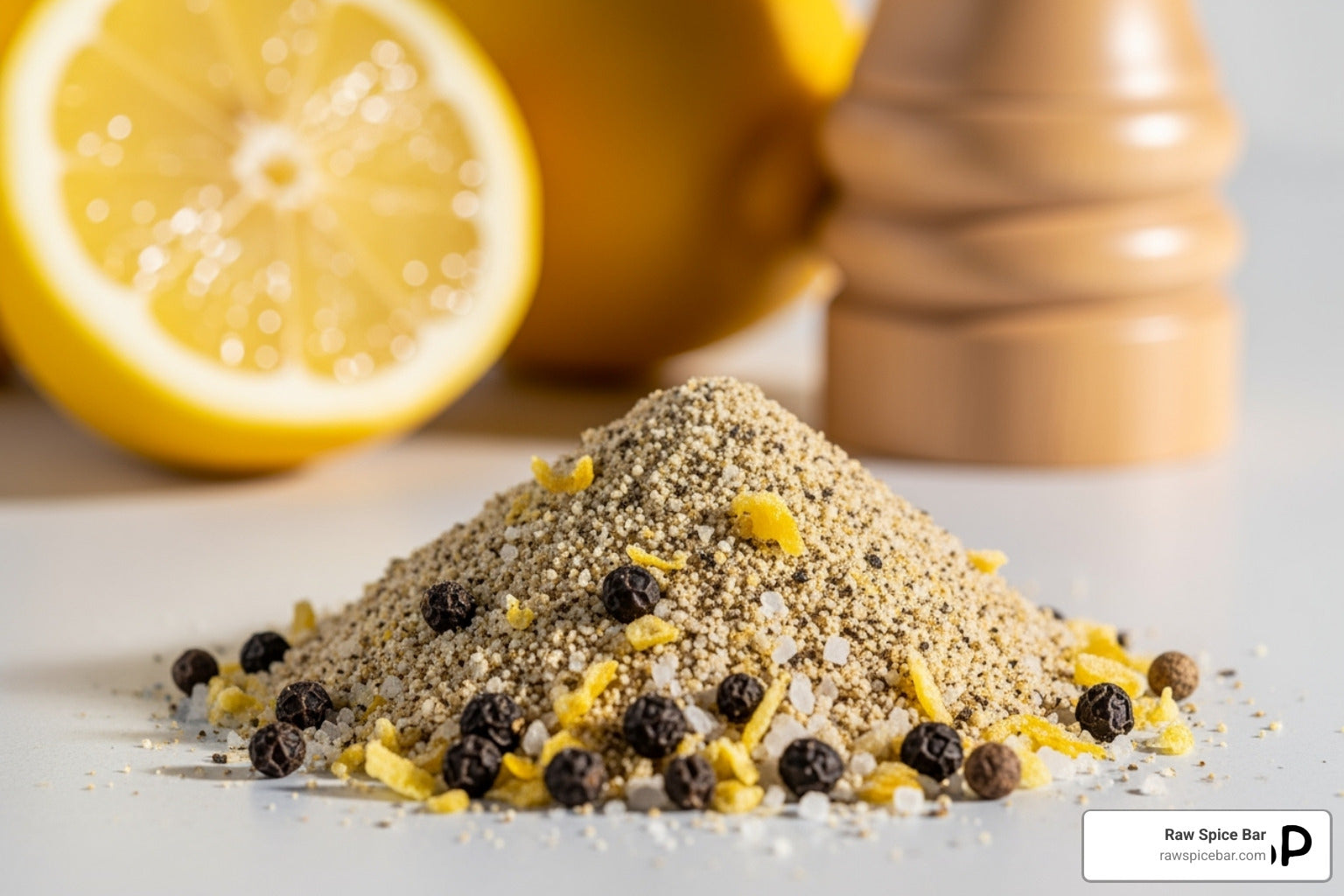Why Cinnamon Advantages Make This Ancient Spice a Modern Superfood
Cinnamon advantages span far beyond adding warmth to your morning coffee or favorite dessert. This aromatic spice, derived from the inner bark of tropical evergreen trees, has been prized for its medicinal properties for thousands of years - and modern science is proving our ancestors were onto something remarkable.
Top Cinnamon Health Benefits:
- Blood Sugar Control - May lower fasting glucose and improve insulin sensitivity
- Heart Health Support - Can reduce cholesterol, triglycerides, and blood pressure
- Powerful Antioxidants - Contains polyphenols that fight oxidative stress
- Anti-Inflammatory Effects - Helps reduce inflammation throughout the body
- Brain Protection - May help prevent neurodegenerative diseases like Alzheimer's
- Antimicrobial Properties - Fights bacteria, fungi, and potentially some viruses
The secret behind these impressive health benefits lies in cinnamon's active compounds, particularly cinnamaldehyde - the compound responsible for its distinctive smell and flavor. This powerful chemical, along with various polyphenols and antioxidants, gives cinnamon its therapeutic punch.
But here's what most people don't know: not all cinnamon is created equal. The type you buy at the grocery store matters more than you might think, especially when it comes to safety and effectiveness.
As Joseph Rosenblatt, founder of a premium spice company, I've spent years sourcing and studying the cinnamon advantages that different varieties offer home cooks seeking both flavor and health benefits. My experience in the spice industry has shown me how the right cinnamon can transform both your cooking and your well-being.
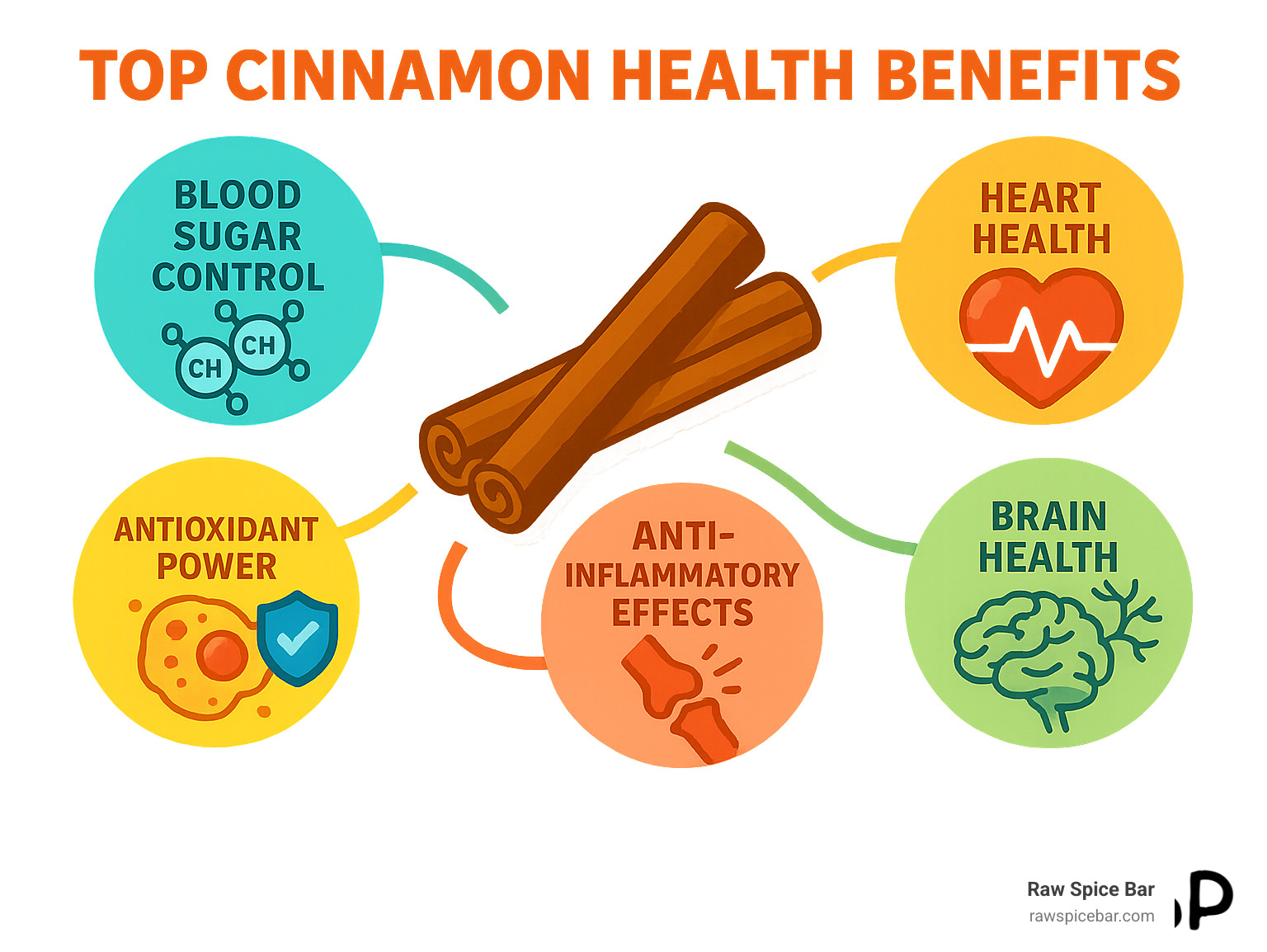
Terms related to cinnamon advantages:
- herbs for healing
- list of herbs and spices
- top 20 healthiest herbs and spices
Not All Cinnamon Is Created Equal: Ceylon vs. Cassia
Here's something that might surprise you: the cinnamon sitting in your spice rack right now could be one of two completely different varieties, and the difference matters more than you'd think for open uping the full cinnamon advantages.
Most people assume cinnamon is just cinnamon, but there are actually two main players in the game. Think of it like comparing a gentle whisper to a bold shout - they're both voices, but they create entirely different experiences.
Ceylon cinnamon, known as Cinnamomum verum, is often called "true" cinnamon. This delicate variety comes primarily from Sri Lanka and has a subtle, sweet flavor that won't overpower your dishes. When you see Ceylon cinnamon sticks, they look like thin, papery scrolls with multiple layers - almost like a delicate pastry rolled up.
But here's the real game-changer: Ceylon cinnamon contains almost no coumarin - less than 0.01 grams per kilogram to be exact. Coumarin is a natural compound that can stress your liver if you consume too much of it. This makes Ceylon the clear winner if you're planning to enjoy cinnamon regularly or in larger amounts.
Cassia cinnamon (Cinnamomum cassia and its relatives) is what you'll find in most grocery stores, especially here in the United States. It's the more affordable option with a stronger, spicier kick that many people associate with classic cinnamon flavor. Cassia sticks are thicker and harder, usually rolled in a single, tight curl.
The catch? Cassia packs a coumarin punch - anywhere from 0.01 to 3.6 grams per kilogram. That's potentially 360 times more than Ceylon! While you're unlikely to reach dangerous levels through normal cooking, it's something to keep in mind if you're sprinkling cinnamon on everything or considering it for health benefits.
| Feature | Ceylon Cinnamon (Cinnamomum verum) | Cassia Cinnamon (Cinnamomum cassia and others) |
|---|---|---|
| Origin | Primarily Sri Lanka | China, Indonesia, Vietnam, Southeast Asia |
| Appearance | Thin, delicate, multi-layered rolls; light brown | Thick, single-coiled bark; reddish-brown |
| Flavor | Mild, subtle, sweet, aromatic | Strong, pungent, spicy, "hotter" |
| Coumarin Content | Very low (less than 0.01 g/kg) | High (up to 3.6 g/kg or 1%) |
| Cost | More expensive | More affordable |
| Best For | Regular use, health benefits, delicate dishes | Everyday cooking, bold flavors |
If you're serious about maximizing cinnamon advantages while keeping things safe, Ceylon is your best bet. Yes, it costs a bit more and might require a trip to a specialty spice shop or online order, but your liver will thank you. Plus, that gentle sweetness works beautifully in both sweet and savory dishes without overwhelming other flavors.
The bottom line? Understanding these differences is your first step toward safely enjoying all the incredible cinnamon advantages this ancient spice has to offer. Choose Ceylon for regular use and health benefits, or stick with smaller amounts of Cassia for that bold, familiar cinnamon punch.
The Surprising Cinnamon Advantages for Your Well-being
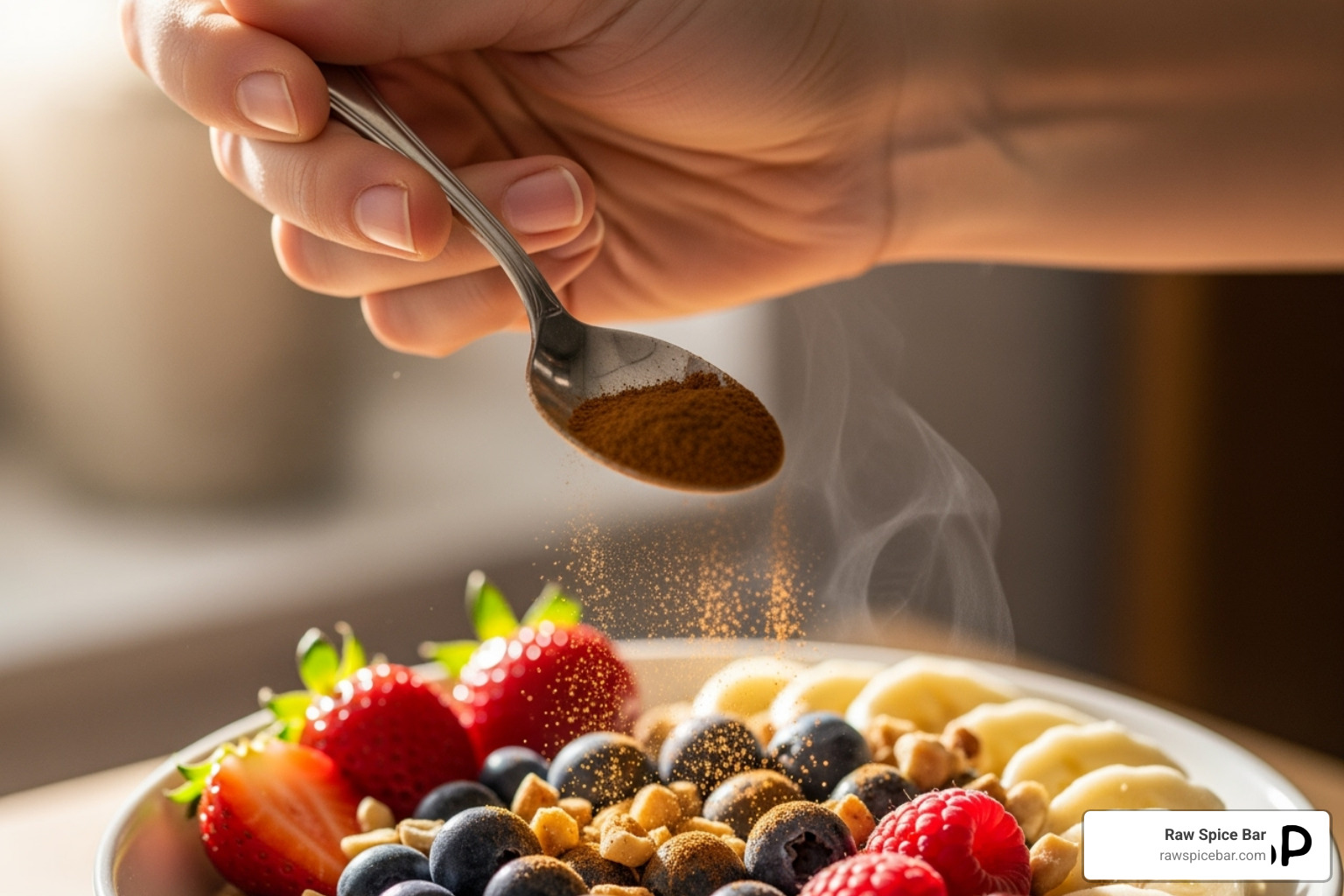
When you sprinkle cinnamon on your oatmeal, you're doing more than adding flavor. You're giving your body a dose of potent antioxidants that rival many superfoods. The polyphenols in cinnamon are so effective at fighting oxidative stress that the spice can even act as a natural food preservative. Cinnamon's anti-inflammatory properties also tackle chronic inflammation, a key factor in many age-related diseases.
These protective effects are the foundation of the cinnamon advantages for your metabolic health. When your body isn't fighting inflammation and oxidative damage, your heart, blood sugar control, and brain function all work better. Research on cinnamon's cardiovascular benefits highlights how profound these effects can be.
Let's explore how this humble spice supports your well-being.
Exploring the Cinnamon Advantages for Blood Sugar Control
For those with type 2 diabetes or insulin resistance, cinnamon can be a powerful ally. Compelling human studies show it improves blood sugar control, with regular use leading to significant drops in fasting blood sugar. It can also improve hemoglobin A1c, the key marker for long-term blood sugar management, by 0.27% to 0.83%—enough to reduce the risk of serious complications.
How does it work? First, cinnamon slows carbohydrate breakdown after meals by interfering with digestive enzymes, preventing sharp sugar spikes. Second, certain compounds mimic insulin, helping cells absorb glucose from the blood more efficiently and reducing insulin resistance.
An effective dose appears to be at least 1.5 grams (about 3/4 of a teaspoon) daily, with those having higher baseline blood sugar often seeing the best results. For more information, the Mayo Clinic offers additional insights.
Supporting Heart Health
The cinnamon advantages for heart health are well-documented. Regular consumption can help lower major risk factors for heart disease, our number one global killer. Studies show cinnamon is effective at lowering cholesterol, particularly total and LDL (bad) cholesterol, partly by reducing fatty acid absorption in the gut.
It also excels at reducing triglycerides, with a review of 13 studies showing significant drops in people with metabolic disease. Furthermore, cinnamon supports healthy blood pressure. The compound cinnamaldehyde helps blood vessels relax, and consistent use for at least 8 weeks can lead to improvements.
Research suggests strong results with 2 grams (about one teaspoon) or less daily for at least 12 weeks, an amount easily added to your diet.
A Potential Ally in Weight Management
While not a magic bullet for weight loss, cinnamon can be a helpful partner. Its fiber content (1.6 grams per teaspoon) promotes increased satiety, helping you feel fuller and curb cravings. It may also reduce the effects of high-fat foods on your metabolism, mitigating some of the stress from less-than-ideal meals.
The primary metabolism support comes from its blood sugar benefits; stable glucose levels prevent energy crashes and the intense cravings that follow. A meta-analysis found that cinnamon supplementation was linked to reductions in body weight and BMI, especially at doses over 3 grams daily. Though more research is needed, the findings show real potential. You can explore more in this systematic review on cinnamon and obesity.
Brain Health and Neuroprotective Properties
Emerging research, primarily from lab and animal studies, suggests exciting cinnamon advantages for brain health. In Alzheimer's disease research, Ceylon cinnamon extract has been shown to inhibit tau protein buildup and even help break down existing clumps. It also shows promise in preventing the toxic beta-amyloid clusters that damage brain cells.
For Parkinson's disease, studies in mice found that cinnamon helped protect neurons, normalize neurotransmitter levels, and improve motor function. Beyond specific diseases, cinnamon may support general cognitive function by increasing proteins that keep brain cells healthy.
While large-scale human trials are needed, these findings suggest a daily cinnamon habit could help protect your brain as you age.
Antimicrobial and Antiviral Effects
Cinnamon's historical use as an infection fighter is backed by modern science. Its antimicrobial properties, mainly from cinnamaldehyde, are potent. Test-tube studies show cinnamon oil is effective at fighting fungal infections, including some that cause respiratory issues.
The spice also inhibits bacteria growth, including harmful pathogens like Listeria and Salmonella. This extends to oral health, where it can help prevent tooth decay and reduce bad breath by fighting plaque.
The antiviral effects are also being explored, with early research suggesting Cassia cinnamon extracts may help protect against viruses like HIV-1, influenza, and Dengue. While much of this research is preliminary, it highlights cinnamon's versatility in supporting the body's defenses.
How to Safely Add Cinnamon to Your Diet
Now that you've finded the impressive array of cinnamon advantages, you're probably eager to start incorporating more of this wonderful spice into your daily routine. The great news is that cinnamon is incredibly versatile and fits beautifully into both sweet and savory dishes. Plus, it's generally safe when you use it in the amounts we typically enjoy in cooking.

Whether you're sprinkling it on your morning oatmeal or adding it to a warming curry, cinnamon brings both flavor and health benefits to your table. However, there are a few important things to keep in mind about dosage and safety, especially if you're hoping to tap into those therapeutic effects we've been discussing.
What is the Right Amount of Cinnamon?
When it comes to using the therapeutic cinnamon advantages, getting the dosage right is crucial. This is especially important when you consider the significant difference in coumarin content between Ceylon and Cassia varieties.
For most of the health benefits we've covered - like blood sugar control and heart health support - research suggests an effective dose of 1 to 6 grams per day, which equals about 0.5 to 2 teaspoons. One particularly interesting study found that taking at least 1.5 grams (roughly 3/4 of a teaspoon) daily helped reduce triglycerides, total cholesterol, LDL cholesterol, and blood sugar in people with metabolic conditions.
If you're specifically interested in blood pressure benefits, you'll need to be consistent for at least 8 weeks to see results. The key word here is consistent - sporadic use won't give you the same benefits.
Here's where things get important for your safety. While cinnamon is wonderfully safe in normal cooking amounts, regularly consuming large quantities of high-coumarin Cassia cinnamon can potentially harm your liver. The safe daily limit for coumarin is 0.1 milligrams per kilogram of your body weight. For most adults, this means more than about 1 teaspoon of Cassia cinnamon daily could push you over that limit.
This is exactly why Ceylon cinnamon, with its much lower coumarin content, becomes the smarter choice if you're planning to use larger therapeutic amounts regularly. If you have any existing liver concerns or you're considering cinnamon supplements, definitely chat with your doctor first. They can help monitor for any potential issues and make sure it's right for your specific health situation.
Creative Ways to Use More Cinnamon
Here at Raw Spice Bar, we've learned that cinnamon is one of those magical spices that crosses cultural boundaries beautifully. From Southern American kitchens to Indian curry houses, from Mexican moles to Moroccan tagines, cinnamon adds warmth and complexity wherever it goes.
Start your morning right by sprinkling cinnamon generously on your oatmeal or yogurt, or blend it into your coffee or smoothie for an aromatic wake-up call. For healthier sweet treats, try adding it to fruit salads, baked apples, or make some cinnamon-roasted almonds for a satisfying snack that boosts sweetness without extra sugar.
Warm beverages are perfect vehicles for cinnamon's benefits. A comforting cup of cinnamon tea, or adding cinnamon sticks to hot chocolate, apple cider, or mulled wine creates infused flavor that's especially delightful on chilly days. You can even add a pinch of cinnamon powder or a stick to your water bottle - cinnamon water can help with blood sugar management after meals and may support your metabolism.
Don't limit this spice to desserts! Savory applications are where cinnamon really shows its versatility. It's essential in Indian curries, Mexican moles, Middle Eastern stews, and North African tagines. Try it in meat rubs for pork loin with cinnamon apples, or add it to a hearty pork noodle soup with anise for a truly unique flavor experience.
Baking remains a natural home for cinnamon - from classic cinnamon rolls and twists to cinnamon raisin bread pudding or an apple cinnamon streusel galette. These traditional uses are still some of the most delicious ways to enjoy the cinnamon advantages.
With so many delicious possibilities, making cinnamon a regular part of your diet becomes less of a health chore and more of a flavorful trip. The key is finding the methods that work best for your taste preferences and lifestyle.
Potential Risks and Side Effects of Cinnamon
While the cinnamon advantages are impressive, I'd be doing you a disservice if I didn't share the complete picture. Like any powerful natural compound, cinnamon isn't without its potential downsides, especially when consumed in large amounts or by people with certain health conditions.
The biggest concern centers around coumarin, that naturally occurring compound we discussed earlier that's found in much higher concentrations in Cassia cinnamon. Think of coumarin as cinnamon's less friendly cousin - it gives some varieties their stronger flavor, but it can cause problems when you get too much of it.
Liver damage is the most serious risk associated with regular consumption of large amounts of Cassia cinnamon. If you consistently exceed the tolerable daily intake of coumarin (about 1 teaspoon of Cassia cinnamon daily for most adults), you could develop liver toxicity over time. This is especially concerning if you already have liver problems or take medications that affect your liver.
Some people experience mouth and lip irritation from heavy cinnamon use, particularly with the powdered form. You might notice sores, a burning sensation, or general irritation. It's your body's way of saying "maybe ease up a bit!"
Though uncommon, allergic reactions can occur. If you notice skin redness, itching, or irritation when cinnamon touches your skin, or if you experience stomach upset after eating it, you might have a sensitivity. Trust your body's signals.
Here's where things get tricky for people with diabetes: while cinnamon's blood sugar-lowering effects are generally beneficial, they can become problematic if you're already taking diabetes medications. The combination might cause your blood sugar to drop too low, leading to dizziness, weakness, or even loss of consciousness. This is why monitoring your blood sugar closely and working with your doctor is so important.
Drug interactions are another consideration. Cassia cinnamon's coumarin content could potentially interact with blood-thinning medications, increasing bleeding risk. There are also theoretical concerns about interactions with certain liver-affecting drugs or anticancer medicines.
If you're pregnant or breastfeeding, it's wise to stick with culinary amounts rather than therapeutic doses, simply because we don't have enough safety data for higher amounts during these important times.
The good news? Most of these concerns disappear when you choose Ceylon cinnamon and use reasonable amounts. As with any significant dietary change, especially if you have health conditions or take medications, a quick chat with your doctor ensures you can enjoy all those wonderful cinnamon advantages safely.
Frequently Asked Questions about Cinnamon's Health Benefits
As someone who has spent years working with spices, I get asked about cinnamon all the time. People want to know how it works, whether it's safe, and if all those health claims are actually true. Let me share the answers to the most common questions I hear.
What is the main active compound in cinnamon?
That wonderful smell that hits you when you open a jar of cinnamon? That's cinnamaldehyde at work. This oily compound gives cinnamon its distinctive aroma and flavor, and scientists believe it's responsible for most of the spice's impressive health effects.
But cinnamaldehyde isn't working alone. Cinnamon is packed with powerful polyphenols - those beneficial plant compounds that act as antioxidants in your body. These polyphenols team up with other beneficial compounds like procyanidins and various flavonoids to create the remarkable cinnamon advantages we've been discussing.
It's like a symphony of beneficial compounds all working together. The cinnamaldehyde takes the lead role, while the polyphenols and other antioxidants provide the supporting harmony that makes cinnamon such a health powerhouse.
Is it safe to take cinnamon every day?
This is probably the question I hear most often, and the answer is yes - for most healthy people, daily cinnamon is perfectly fine. I sprinkle it on my morning oatmeal without a second thought, and you probably can too.
The safety really comes down to two things: what type of cinnamon you're using and how much you're consuming.
Ceylon cinnamon is your safest bet for daily use. It's the one with virtually no coumarin - that compound that can stress your liver in large amounts. You could enjoy Ceylon cinnamon daily without worrying about reaching harmful levels.
Cassia cinnamon requires a bit more awareness. While your typical culinary sprinkle here and there is completely fine, consistently eating more than a teaspoon or two daily might push you over the safe coumarin limit, especially if you have existing liver concerns.
Here's my practical advice: if you're just adding cinnamon to your coffee or oatmeal, don't worry about it. If you're considering supplements or therapeutic doses, chat with your doctor first. They can give you personalized guidance based on your health situation.
What is the scientific consensus on the cinnamon advantages?
As much as I'd love to tell you that science has definitively proven all of cinnamon's benefits, the honest answer is more nuanced. The research is promising but mixed, and scientists are still working to understand the full picture.
Many human studies have shown modest improvements in blood sugar control, with some trials finding decreases in fasting glucose and meaningful drops in HbA1c levels. Heart health markers like cholesterol and triglycerides have also improved in various studies. These aren't earth-shattering changes, but they're meaningful enough to get researchers excited.
The challenge is consistency. Not every study shows the same results, and that's partly because researchers are using different types of cinnamon, different doses, and studying different groups of people. It's like trying to compare recipes when everyone's using different ingredients and cooking methods.
What scientists agree on is that we need larger, longer-term trials to really nail down how effective cinnamon is and what the optimal doses might be. The studies we have now are often small or short-term, which makes it hard to draw definitive conclusions.
The current scientific thinking is that cinnamon should be considered an adjunct therapy - something that supports your overall health strategy rather than replacing proven medical treatments. If you have diabetes, for instance, cinnamon might be a helpful addition to your medication and lifestyle changes, but it's not a substitute for them.
The exciting part is that research is ongoing. Scientists are working to identify exactly which compounds in cinnamon are responsible for the benefits, and how different preparation methods (like water extracts versus whole powder) might affect their potency. We're still uncovering the full story of this ancient spice's modern potential.
Conclusion
The journey through the cinnamon advantages reveals just how extraordinary this humble spice truly is. What started as a warming addition to your morning oatmeal or evening tea transforms into something much more significant when you understand the science behind it.
From its powerful ability to help regulate blood sugar levels to its impressive heart-protective properties, cinnamon offers benefits that our ancestors intuited but modern research is finally proving. The antioxidant power packed into every teaspoon, combined with its anti-inflammatory effects and potential brain-protecting qualities, makes cinnamon a genuine superfood hiding in plain sight in your spice cabinet.
But here's what matters most: not all cinnamon is created equal. The choice between Ceylon and Cassia cinnamon isn't just about flavor preferences - it's about safety and maximizing those health benefits. When you're sprinkling cinnamon on your morning coffee or stirring it into a savory tagine, choosing Ceylon cinnamon means you can enjoy those cinnamon advantages without worrying about coumarin content.
As someone who's spent years working with spices from around the world, I've seen how the right ingredients can transform not just your cooking, but your entire approach to wellness. Cinnamon embodies this perfectly - it's a spice that makes your food taste amazing while potentially supporting your health in meaningful ways.
The science is still evolving, and researchers continue to uncover new aspects of cinnamon's therapeutic potential. But what we know now gives us every reason to accept this versatile spice as both a culinary staple and a natural ally for our well-being.
Whether you're managing blood sugar, supporting heart health, or simply wanting to add more antioxidant power to your daily routine, cinnamon offers a delicious path forward. The key is choosing quality spices and using them consistently in ways that bring joy to your kitchen.
Ready to experience the difference that freshly ground, premium spices can make? Explore high-quality, freshly ground spice blends from Raw Spice Bar and find how the right cinnamon can lift both your cooking and your health journey.


